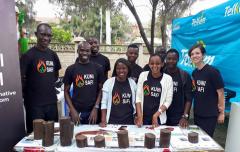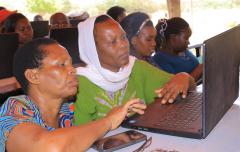Grassroots Energy turns waste into progress on multiple Sustainable Development Goals in India
In a series of stories, we are profiling the four winners of the 2020 Energy Access Booster Award, offered to entrepreneurs operating in Africa and Asia, with a focus on two sectors: clean cooking and waste-to-energy. The awards are sponsored by TOTAL, ENEA Consulting, Acumen and Sustainable Energy for All (SEforALL).
Highlights
Mateen Abdul knows that a shift towards a “circular economy”— an economic system focused on eliminating waste and reusing resources — is integral towards achieving the UN’s Sustainable Development Goals (SDGs).
Recognizing the importance that governments and the private sector are now placing on this concept of circularity, Abdul has built a waste-to-energy business that supports progress against multiple SDGs. He is the CEO and Co-Founder of Grassroots Energy, which operates in India and has a mission to use technologies to end energy poverty and enable soil-regeneration.
“We started Grassroots Energy with the intention to solve the energy access problem with a slightly different approach,” Abdul says. “We realized that in many parts of the world where energy access is a challenge, there is widely available agriculture or farm residue that is not fully utilized and actually poses an environmental threat.”
Founded in 2016, the company has developed a broad business model that uses multiple technologies to produce and distribute biogas, from agricultural and farm waste that can be used for electricity generation and clean cooking. While the company was originally focused on biogas-to-electricity, in 2018, it shifted towards developing a solution that would help the approximately 3 billion people worldwide who lack clean fuels or technologies for cooking.
Grassroots Energy has developed a system for processing waste through small-scale “modules” that enrich biogas to bioCNG. These modules involve a biogas digester and enrichment system, which makes the processed gas suitable for consumer use. The company has also developed technology for storing the gas in cylinders rather than piping the gas into a grid, something that doesn’t exist in many remote communities.
“We believe we are one of very few organizations worldwide working in the bioCNG [renewable natural gas] space focused on a distributed model,” Abdul says. “The technology exists elsewhere but at large-scale. We are bringing down the scale so that it can be deployed in wider, smaller communities.”
Abdul claims the system offers multiple social, economic and environmental benefits that have been proven through an initial pilot operation. Firstly, it mitigates methane emissions from decomposing agricultural waste, which is a major contributor to global emissions. The system supports overall waste remediation in communities by collecting vast amounts of agricultural byproducts that can pose health risks to people through exposure. By setting up distributed, small-scale operations, Grassroots Energy creates up to 50 local jobs for waste collection, biogas module operations, and fertilizer distribution.
Meanwhile, Grassroots Energy offers a clean fuel alternative to people in the immediate vicinity, with each module providing fuel to 15 families, enabling them to step out of energy poverty. Abdul compares his company’s biogas to commonly used LPG, emphasizing that bioCNG is a cleaner and lower-carbon fuel. Locally produced and distributed bioCNG has the advantage of not relying on the complex logistic networks and not being susceptible to major price fluctuations associated with LPG.
The most obvious example of how the company provides “circularity” is in using residues left behind from the biogas purification process to produce organic fertilizers, which are then sold to farmers as an alternative to chemical fertilizers. Replacement of chemical fertilizers with organic fertilizers enhances the nutrients in the soil, leading to reduced costs and higher incomes for farmers.
Offering solutions to multiple SDGs, including those related to energy access (SDG7), climate action (SDG13), land protection (SDG15), among others, it is easy to see why Grassroots Energy was recently awarded an Energy Access Booster award.
In addition to a financial contribution to the company, Grassroots Energy will receive technical and advisory support from partners involved in the Energy Access Booster, which Abdul says he is particularly excited about.
“The biggest value add is the technical support, which will help us to finetune our product and create a very strong offering to the market,” he says. “The partners bring strong networks and expertise in the African market, which is somewhere we would like to expand to in the next two to three years. So, the Energy Access Booster can help us make this jump.”
Following the success of its pilot, Grassroots Energy plans to have its first full-scale bioCNG installation operationalized in Q3 2020. The company’s goal is to have 50 installations operationalized in the next three years, producing 20,000 cubic metres of bioCNG.
Related content

SDG7 News
26 Mar 2020

SDG7 News
30 Apr 2020

SDG7 News
22 Mar 2019

SDG7 News
18 Jul 2019
